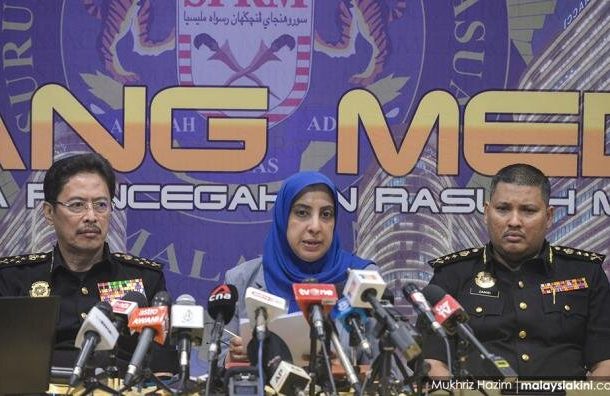Reveal only what is necessary and protect whistleblowers, civil group urges MACC
KUALA LUMPUR, Jan 9 — The Centre for Independent Journalism (CIJ) has urged the Malaysian Anti-Corruption Commission (MACC) to publicly disclose if measures have been taken to guarantee the protection of whistleblowers.
Following yesterday’s release of nine audio recordings by MACC of former prime minister Datuk Seri Najib Razak, CIJ said the commission should also reveal if there are existing internal systems and controls to ensure that the necessity and proportionality tests have been carried out, prior to releasing the audio recordings.
“The MACC has declined to reveal how they obtained the recordings, and news reports suggest that they were sent anonymously. It is thus unclear whether or not the surveillance was carried out by the State or provided to the commission by a whistleblower,” CIJ said in a statement.
While acknowledging the issue is within the scope of MACC’s mandate and in the interests of accountability and transparency, since the recordings’ involve the possible commission of serious offences including abuse of power by those in high office, the centre said the manner in which the surveillance was carried out could involve serious breaches of privacy.
“This important human right is enshrined in the Universal Declaration of Human Rights and the International Covenant on Civil and Political Rights, and any derogation must be prescribed by law, be necessary to achieve a legitimate aim and be proportionate to the aim pursued.
“If the surveillance was carried out by the State, international human rights standards require that the surveillance must meet stringent criteria,” CIJ said.
Under the International Principles on the Application of Human Rights to Communications Surveillance, authorisation must be granted by a competent judicial authority and must also adhere to several points, such as the need to conduct surveillance as there is a high degree of probability that a serious crime or specific threat to national security has been or will be carried out.
“Others include a high degree of probability that evidence and material relevant to the serious crime of specific threat would be obtained, that other less invasive techniques have been exhausted or would be futile, and the surveillance suggested is the least invasive option and will be confined to that which is relevant and material.
“Lastly, any excess information will not be retained, but will be promptly destroyed or returned. The principles also indicate that States should enact legislation criminalising illegal communications surveillance by public or private actors, with avenues for redress by those affected, although the law should also recognise and provide for protection for whistleblowers,” CIJ said.
In its view, MACC’s action in releasing all nine recordings verbatim only serves to highlight the unacceptable and very low threshold currently required by the Criminal Procedure Code (CPC) in which the police are authorised to listen in on private conversations and read messages.
Section 116c of the CPC enables the Public Prosecutor to authorise the police to intercept and record messages or conversations, if it is considered that such communication is likely to contain any information relating to the commission of an offence, with any evidence obtained in this manner admissible in court.
“To balance the public interest and the right to privacy, and in the interests of proportionality, it may have been sufficient for the MACC to provide the public with the relevant information in a report or transcript.
“This would have avoided the unhealthy, sexist and intrusive speculation and comments regarding the former prime minister and his marriage, which are unrelated to the offences allegedly committed,” the centre said.
By taking steps to protect whistleblowers and ensuring only relevant material pertinent to the investigation is publicly released, the CIJ said it will reassure Malaysians that surveillance information obtained by government authorities would be handled responsibly and in line with international human rights standards.
“In the light of these events, we would encourage the government to undertake a review of CPC’s Section 116c to ensure it is in line with international human rights standards and that our Malaysians are not being subject to unnecessary and intrusive surveillance and interception of communication without due process.
“A review of privacy laws should be undertaken, and whether additional laws and measures are needed to criminalise illegal communications surveillance and interceptions, with sufficient protection for whistleblowers. MACC should also publish their guidelines and internal controls on when they can disclose surveillance information in the public interest and what safeguards are in place for whistleblowers,” it said.
Source and header picture credit: Malay Mail Online
